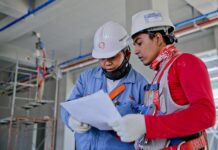Sure, safety equipment like collapsible cones and goggles will never go out of style. Nor will your favorite pair of steel-toe boots. But, the construction industry is changing, and technology’s making its the way in.
For construction companies who don’t adopt, this can mean loss of clients, loss of revenue, and potentially shutting your doors down in the near future. Therefore, it’s essential to understand IoT (internet of things), AI (artificial intelligence), and how these will work together to improve operational efficiency, on construction sites now, and in the near future.
IoT: What is it?
The Internet of Things is basically all connected devices. Think of it as the tablet, the smartphone, the software that connects people to their work. How is that used in construction?
Well, today, you’ll see construction managers walking through a job site with a mobile phone in hand. This was unheard of a few years ago. Why do they do this? To communicate, to share real-time data, and to utilize the built-in chips in their employees’ goggles, to make sure they’re not making errors in judgment in a job.
You’d be surprised just how much mobile devices are utilized and can help on construction sites.
Benefits IoT Can Bring
There are countless benefits to implementing IoT into a construction site; some of these benefits include
- Fitting equipment with sensors to avoid loss or theft (heavy-duty construction equipment is costly to replace)
- Internal chips in material indicate when there are issues, and repairs need to be made (stop problems before they occur)
- Increase safety with built-in alert systems and sensors to warn employees of potential dangers
- Use BIM, CAD, and 3D modeling to showcase to clients what a project will look like before you ever begin construction on a site
The IoT helps construction crews implement change, increase safety, and improve efficiency. It’s changed the industry in many ways, and with future developments and advancements, it will bring far more changes in the near future.
What About AI?
Artificial intelligence can be used in many ways on construction sites, as well. For example, Artificial Neural Networks are utilized to help reduce operational costs.
By predicting cost overruns, using the information on historical data, loss of materials, and manager input, this information can inform current managers were to reduce costs, cut back on crews, and otherwise save a great deal of money on completing projects.
Improving Design
A few years ago, 3D printers were rarely used. Today, they can be used in construction to build pieces that are actually utilized on a construction project.
Or, a 3D printer can print a life-sized model replica of a finished project, to give clients a better idea of what it will look like, and to showcase to employees what their ultimate goal is in construction.
With the right equipment in place, it’s easy to highlight the most minute details, and bring things to life which were never possible to see on 2D, architect-designed, blueprints which were utilized for so many years in the industry.
Mitigate Risks and Plan
The use of AI and software today can help mitigate risks on a job site. Information that’s entered into a program is shared in real-time, with other managers.
In fact, in many cases, it can indicate what employees are doing, what processes they can streamline, how to avoid major mistakes, and what steps to take to reduce the time it will take to complete specific operations on a job site.
With CAD software, construction companies can plan projects to highlight to clients what the work will look like. This software is so sophisticated it accentuates curves, detail, color, and minute details, which allow construction managers to work down the overall cost of a project, down to the penny.
This wasn’t possible in years past, and as time passes, these pieces of equipment and software are only going to become more advanced and help construction teams better plan for projects they’re undertaking as a company.
Without the adoption of AI and IoT, companies are going to fall behind in a highly competitive industry. Changes have already taken place and revolutionized the industry. These changes are bound to continue, and new technology and software will further impact the construction industry in the future as well.
































